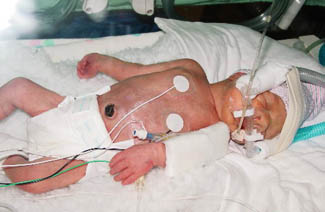|
During your baby's first week in the NICU, the neonatal health care team evaluates
and stabilizes your baby's condition, giving him or her the best chances for
survival. The NICU team may take some or all of the following measures to help
your baby during the first week.
- Some NICUs put babies on IV antibiotics immediately as a precautionary
measure until they receive results from bloodwork.
- Depending on your baby's gestational age, he or she may be tested
for various complications common in preemies. For example, your baby might
have a head ultrasound to check for intraventricular hemorrhage and blood
tests to check for infection and monitor bilirubin levels. Many hospitals
will also test preemies' eyes. Your baby will have several tests over the
course of his or her NICU stay.
- If your baby has severe jaundice or an infection, he or she may receive
a blood transfusion. Because transfusions are fairly common in the
NICU, your neonatologist may discuss the possibility of transfusion with you
during one of your pre-delivery meetings.
- Your baby may receive a dose or course of surfactant in the first
few hours after birth to help his or her lungs stay inflated and improve the
effectiveness of the breathing treatments.
- Your baby may receive medication to keep him or her sedated or immobile
while on the ventilator. In addition, your baby might be given an analgesic
(such as Fentanyl) for pain management.
Remember that each baby's experience is different. Some PROM preemies will have
none of these complications and will be discharged from the NICU relatively
quickly, while others will have complications in addition to those listed and
longer NICU stays.
- One of the most common complications for PROM preemies is pulmonary
hypoplasia (underdeveloped lungs). PROM preemies often have this condition
because the lack of amniotic fluid limits the opportunities for the baby's
lungs to expand fully, which is what stimulates lung development. If a baby
is born with hypoplastic lungs, it will be difficult or even impossible for
him or her to breathe normally.
- PROM preemies may also experience orthopedic complications caused
by not being able to move easily because of low amniotic fluid. For example,
PROM babies may be born with a club foot, dislocated hips, or other contractures
of limbs. Orthopedic complications are usually minor and correctable through
surgical or physical therapy after your baby is discharged from the NICU.
- Babies experience respiratory distress syndrome (RDS) when the air
sacs in the lungs collapse between breaths as a result of insufficient surfactant
in the lungs. Having to refill the air sacs with every breath means that the
baby's lungs must work much harder than if he or she was producing enough
surfactant naturally. RDS will improve with time, and is treated by administering
surfactant and using breathing equipment. The majority of preemies born at
26 weeks gestation and earlier will have RDS. Steroid injections have been
shown to reduce the incidence of RDS if given a minimum of 24 hours prior
to delivery.
- Apnea of prematurity is a pause in a preemie's breathing that lasts
more than 20 seconds. Apnea will also improve as the part of the brain that
regulates breathing has a chance to become more developed, usually within
about 2 to 4 weeks of the baby's due date. Apnea can be treated with caffeine
(IV or oral) or other medications, although mild cases may be treated simply
with stimulation instead of medication. Most NICUs will not discharge a baby
until several consecutive days without apneic episodes. A condition associated
with apnea is bradycardia, which is when a baby's heart rate drops
to less than 100 beats per minute (120 to 160 beats per minute is normal).
- Chronic lung disease (CLD) -- also known as bronchopulmonary dysplasia
(BPD)-- occurs when a baby's breathing equipment causes inflammation or
damage to a baby's lungs. CLD/BPD is diagnosed by chest xray and is treated by
slowly weaning the baby off respiratory machines, allowing the lungs to heal
over a period of a few weeks or more. Although the lung tissue is chronically
damaged, as the baby's lungs mature their total capacity can reach a point where
the damaged area is of minor importance.
- Patent ductus arteriosis (PDA) is a condition involving a blood vessel
close to the heart which is open in the womb but usually closes within the
first few days after birth. When the blood vessel does not close, it can strain
the baby's lungs and cause breathing problems. PDA is diagnosed by xray or
echocardiogram (ultrasound). PDA sometimes resolves without any medical intervention,
but can be treated with medication or surgery.
- Necrotizing enterocolitis (NEC) affects the baby's intestinal lining.
NEC is not common, but can be very serious and lead to apnea, and bradycardia,
and respiratory problems. A NEC diagnosis is confirmed with xray. Treatment
for NEC includes discontinuing oral feedings and administering antibiotics,
but very serious cases may require surgery.
- Reflux occurs after feeding, and causes food to come back up the
esophagus. Signs of reflux include frequent vomiting, aspiration pneumonia
(when food then gets inhaled into the lungs), apnea, bradycardia, and oxygen
desaturation. Reflux can be diagnosed by a pH probe, a baruim swallow, or
upper GI study. Although babies usually grow out of reflux, it can be treated
by adjusting the amounts, positions, frequency, or thickness of feeding. In
some cases, medications such as Reglan or Zantac can be helpful. Surgical
treatment for reflux is rare.
- Intraventricular hemorrhage (IVH or bleeding in the brain) is diagnosed
by a head ultrasound, usually within the first week after birth. IVH is fairly
common in preemies weighing less than 1000 grams at birth, but less common
in larger babies. This type of hemorrhage is classified by grades 1 through
4. Grades 1 or 2 IVH are considered mild and generally create little risk
or complications. Risks increase for Grades 3 and 4. Steroid injections prior
to delivery and receiving indomethacin immediately after delivery have been
shown to reduce the incidence of IVH.
- A baby's bilirubin levels generally rise after birth, then begin to gradually
decrease after 5 to 7 days. Jaundice occurs when bilirubin levels accumulate
in the liver faster than it can be broken down. Most preemies experience some
degree of jaundice and are usually treated for a few days or more with
"bili lights" or phototherapy. In severe cases of jaundice, the baby may require
a blood transfusion.
- Retinopathy of prematurity (ROP) occurs when changes in oxygen flow
or other factors can cause abnormal blood vessels to grow and damage the retina.
ROP is more common in preemies born before 28 weeks. About four to six weeks
after delivery, an opthamologist will examine your baby's eyes for ROP. In
about 90% of ROP cases, abnormal blood vessels will disappear without treatment
within a few months past the baby's due date. More advanced cases will usually
receive cryotherapy or laser therapy, or surgery.
Babies born prior to 34 weeks gestation have not yet developed the ability to
coordinate the reflexes to suck and swallow with breathing. For this reason,
babies born prior to 34 weeks may need one of these interventions to help with
feeding.
- Total parenteral nutrition (TPN) bypasses the digestive system and
goes directly into the baby's bloodstream through an IV or central line. TPN
is often used for babies born at less than 34 weeks gestation and some neonatologists
believe that introducing food to the esophagus too early will cause the baby
to develop reflux.
- Gavage feedings involve feeding your baby breast milk or formula
through a tube that goes from his mouth or nose into his or her stomach.
- Preemies frequently have trouble drinking from a nipple (breast or
bottle) at first. If your baby is having trouble nursing, ask the lactation
consultant whether a silicone nipple shield would help with nursing.
The lactation consultant will be able to instruct you on using the nipple
shield and where to find one.
You may not feel like taking photos of your baby during this first week in the
NICU, but the members of the PROM list encourage and recommend that you do so.
You do not have to look at the photos until you are ready, but at least you
will have them if you or your baby would like to see them later.

When you take photos, it is good idea to have some object next to your baby
to give a sense of scale. If possible, try to take as many of the photos as
possible without using a flash, as the flash causes disturbance to the babies
in the room. Ask the health care team before you use the flash. If you feel
that it would be too difficult for some people to see photos of your baby with
all the tubes and wires, consider having the photos printed in black and white,
taking some photos at a greater distance, or taking photos just of your baby's
hand or foot in your hand. Also, plan to take photos of your baby's health care
team to help your family remember them afterwards.
You may want to keep a disposable camera at your baby's bedside just in case
you leave yours at home, or if the nurses want to take photos while you are
away. If you and your partner or spouse feel uncomfortable taking the photos
yourselves, ask the NICU nurses to take the photos for you. Some NICUs have
digital cameras and will give you a disc of photos when you are discharged.
Next page >> Article by Jodi Donnelly, Mommy to Anthony PROM @ 16
weeks, born in 2004 @ 31.5 weeks, 41 days in NICU and now thriving
and Kay Squires, september 2005
Special thanks to Inkan, Jen, Jody, Lise, Sonya, Valerie, Beth and the members
of the PROM list
© 1998-2025 Inkan, The PROM Page
|
 |
 |
 |
 |
 |
 |
 |
Preparing
for a
PROM Preemie |
 |
|

